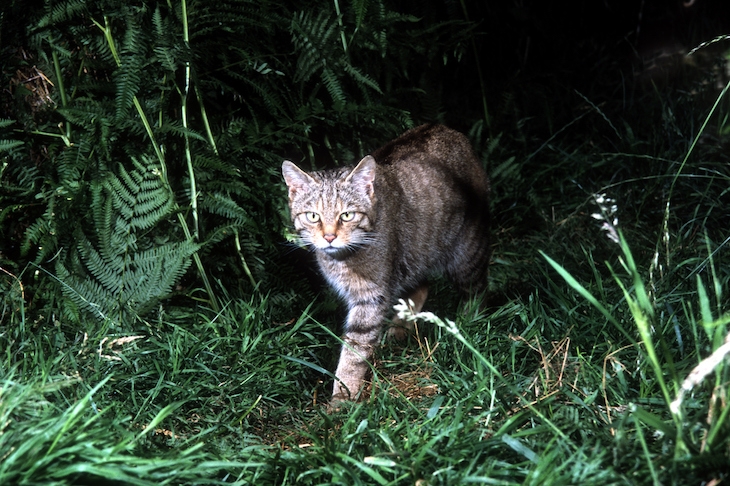As naturalist, educator and writer, John Lister-Kaye was for many years a voice in the wilderness. In 1976, when nature conservation was still considered a benign eccentricity, he moved into a crumbling estate in the Scottish highlands. Taking as its credo a text from Gavin Maxwell —‘I am convinced that man has suffered in his separation from the soil and from the other living creatures of the world’ — he set up the Aigas Field Centre. Since then, tens of thousands of people have visited it. Schoolchildren and adults alike have been encouraged to share his wonder for the natural world. He has pioneered the breeding of beavers and wild cats; he has led wildlife expeditions to several different continents; and he has written a series of charming and persuasive books about our damaged relationship with nature.
In The Dun Cow Rib he returns to his childhood. In one way it’s a fairly conventional memoir of the unconventional world of Britain’s minor nobility. Lister-Kaye himself is the holder of a baronetcy that goes back to the 17th century. There were estates in Yorkshire and Warwickshire, and Victorian wealth from the coal beneath them, but by the time John was born in 1946, the pits had gone and the prosperity had all but disappeared.
His father struggled to adapt. He was a man for whom expressing emotions and wearing pullovers were signs of the same moral weakness. He worked as a peripatetic businessman while young John was farmed out to a boarding school. The headmaster was a not-untypical tyrant who lectured the boys on humility and was quick to use the cane. He had it in for Lister-Kaye, and when the budding naturalist clipped the tail feathers of the school peacocks he was beaten severely and sent home for good.
John’s mother represented an isolated point of warmth. She was devoted, patient and understanding — but also constantly ill, afflicted by a progressive cardiac condition. John was forever being taken out of school to go and visit her in hospital. She survived a number of experimental operations but died when he was in his early twenties.
His redemption — and the point of this book — was nature, animals and the world which lay beyond the chilly confusions of his homes and schools. Early on he developed a diligence towards his fellow creatures that went beyond mere curiosity. When his father lost interest in a flock of doves, the seven-year-old John took over, working out the number of days for incubation in order to witness the process of hatching. He collected butterflies and moths. He reared badger cubs, roe fawns, leverets, owlets and ‘a brood of 11 mallard’.
After his disastrous prep school, Lister-Kaye was lucky to be sent to the now-defunct Allhallows near Lyme Regis, surrounded by 800 acres of National Nature Reserve. Under the tutelage of Tommy Wallace, the school’s head of biology, who was also in charge of monitoring the reserve, he spent his extra-curricular time pressing wild flowers, washing skulls, logging fungi and birds, and learning.
His enthusiasm made him a ‘nature freak’ at school; with the need for a career, his father explained that this was all very well as a hobby, but it would hardly lead to a proper job. He was found a post in industry, and was miserable. Two things then altered the course of his life. One was the 1967 oil spillage from the Torrey Canyon, which highlighted to him and many of his generation the calamitous course the world was on. The other was meeting Gavin Maxwell.
Then in his fifties, the troubled Maxwell was something of a celebrity. When he asked Lister-Kaye to collaborate on a book of British fauna and on developing his Scottish island, Eilean Bàn, as a private zoo, John became dizzy with excitement. He chucked in his job and went north. Both projects foundered when Maxwell died — but Lister-Kaye was now committed. He moved into a highland cottage without running water and took the spirit of Maxwell’s vision to set up Aigas.
The story of his early life reveals a particular strain of idealism that emerged from the old certainties of British privilege. While the animal kingdom was still a hunting ground for most of their ilk, sensitive souls like Lister-Kaye and Maxwell sensed that the time had come for a less destructive relationship. Other well-heeled pioneer conservationists of the time included Guy Mountfort, Julian Huxley and Max Nicholson, who together established the World Wildlife Fund.
Lister-Kaye grew up in an English countryside that was still thickly populated with agricultural workers, fauna, butterflies and birds. But the 1950s were also a turning point. Intensive ways of farming were taking over, driven by the policy of food self-sufficiency. We are now reaping what was sown then — a species-depleted landscape worked by mechanised contractors. The particular span of John Lister-Kaye’s life adds both authority and poignancy to his deeply affecting recollections.






Comments